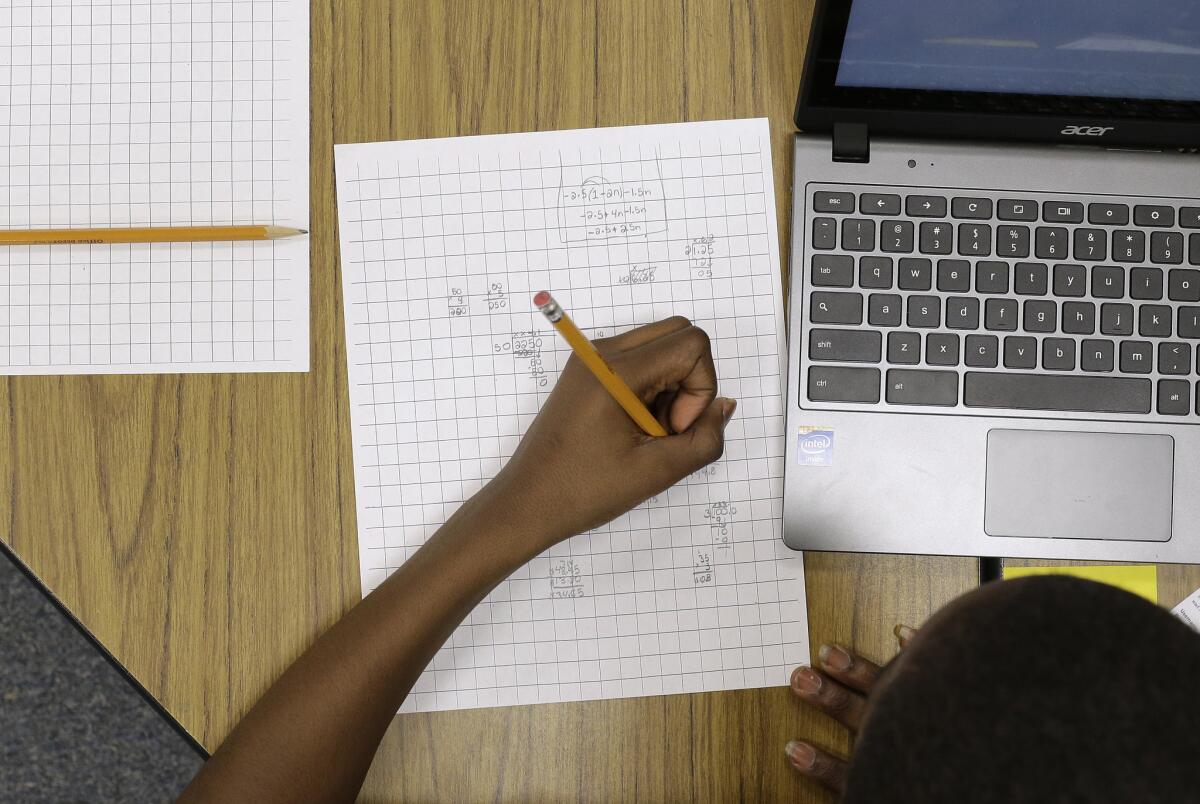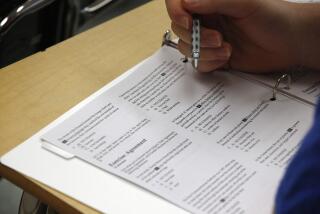Op-Ed: No Child Left Behind and testing help hold schools accountable

The controversial education law known as No Child Left Behind is up for reauthorization, and amid the nuances under debate one question stands out: Will pressures from the left and right force the federal government to abandon its annual, statewide testing requirements?
When enacted into law in 2002, NCLB had widespread, bipartisan backing including support from President George W. Bush and Sen. Edward “Ted” Kennedy . Nonetheless, it had numerous creaky provisions, not least of which were the testing provisions that held schools accountable for student achievement.
Its measure of whether a school was failing was too bizarre for most people to understand and placed schools with the most challenged students at a disadvantage. Other mandates were equally meaningless. Giving students at failing schools a choice among other schools in their district simply shuffled children around the city. Requiring after-school programs did nothing to improve the school day itself.
All such provisions were potentially up for revision in 2007, but Congress couldn’t agree on how to bring the law up to date. As a fix, Obama’s education secretary, Arne Duncan, waived for most states the law’s most onerous provisions. Still, the administration continues to support testing every student in math and reading in grades three through eight and again in high school.
Now, the new Republican Congress is making another effort to revise NCLB,and tests are in the crosshairs. Unions, including United Teachers Los Angeles, oppose them for fear the data will be used to evaluate teachers. Conservatives fear tests will be used to impose “progressive” Common Core standards, which are backed by the White House and designed to set the same broad expectations for all U.S. students.
Civil rights groups, on the other hand, are fighting to keep testing in place. “Now is not the time to make a U-turn in holding states and school districts accountable for providing a quality education to all children,” declared Nancy Zirkin, executive director of the influential Leadership Conference on Civil and Human Rights, a coalition of more than 20 organizations.
Her stance is backed by solid research evidence. Summing up the best studies, Martin West, of the Harvard Graduate School of Education, told a congressional committee in January that NCLB “worked to generate modest improvements in student learning, concentrated in math and among the lowest-performing students — precisely those on whom the law was focused.” In L.A. after the law was implemented, student performance improved between 2003 and 2014 by well over a year’s worth of learning in fourth- and eighth-grade reading and math.
Testing also remains popular with the public. In 2012, the journal Education Next asked a cross section of the American public whether “the federal government [should] … require that all students be tested in math and reading each year in grades 3-8 and once in high school.” More than 80% of those surveyed responded favorably. In 2014, Education Next asked the public whether it supported “standards for reading and math that are the same across the states [and] will be used to hold public schools accountable for their performance.” Only 16% opposed the idea.
In Washington, however, interest-group pressure may matter more than public opinion. Despite strong evidence to the contrary, teachers unions deny that testing benefits disadvantaged students. No Child Left Behind, “in emphasizing testing, pulled us away from the focus on kids, especially those who are poor,” writes Randi Weingarten, president of the American Federation of Teachers.
Weingarten says we should be “supporting, not sanctioning, kids, teachers and schools.” One suspects that “teachers” is the key word in the phrase. They resist the use of student scores to measure job performance because, they say, scores fluctuate for many reasons. But most evaluations of teachers are based on performance over several years. And when former Washington, D.C., school superintendent Michelle Rhee put into place a performance-based pay plan that dismissed the weakest teachers and paid the best ones six-digit salaries, test scores soared.
As a compromise, unions propose testing students just once in elementary school, once in middle school and once in high school. But if you don’t test students every year, you cannot detect the progress they are making under each teacher. Without that information, performance pay and tenure based on merit fly out the window.
Testing critics also want Congress to let each school district come up with its own tests and its own criteria for evaluating student performance. But without a consistent program it becomes impossible to determine which schools are getting it right — and which are not.
Union opposition is undermining Democratic support for testing. But that wouldn’t mean much in a GOP-controlled Congress were it not for tea party fears of federal school control in the form of the Common Core. Trying to kill Common Core, tea party activists have added an anti-testing plank to their agenda, presumably because testing would only solidify the power of national standards they dislike.
Together the left-right alliance is so powerful, the middle is struggling to hold its own. Already, California has placed a one-year moratorium on systematic testing, claiming schools need a break while the state develops Common Core tests.
Annual, statewide testing should be saved, and it can be if moderates in both parties fight off special interests. But perhaps the most likely outcome is a decision to kick the can down the road two more years, leaving No Child Left Behind and testing to be tackled by the next president.
That is unfortunate. There are many elements of law that deserve tweaking, but even if the NCLB bathwater needs changing, our kids are not likely to learn more if schools and teachers are not held accountable.
Paul E. Peterson is a professor at Harvard University, where he directs its Program on Education Policy and Governance. He is also a senior fellow at the Hoover Institution at Stanford University.
Follow the Opinion section on Twitter @latimesopinion and Facebook
More to Read
A cure for the common opinion
Get thought-provoking perspectives with our weekly newsletter.
You may occasionally receive promotional content from the Los Angeles Times.





